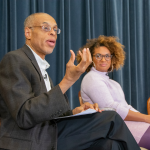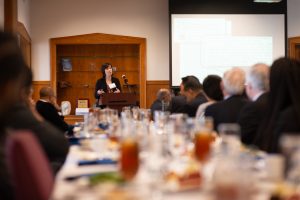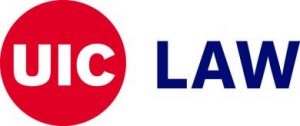MOSAIC IP LAW AND POLICY ROUNDTABLE CONFERENCE
Through these conferences, IP scholars can work together with political activists, practicing attorneys, community organizers, and policy makers to produce activist scholarship, to collaborate on various IP Empowerment policy initiatives and projects, and to otherwise help to shape and effectuate a progressive and contemporary IP socio-legal agenda.
REGISTRATION NOW OPEN
At the IP Mosaic Conference, a diverse collective of academics, policy leaders and activists will convene to consider and critique intra and extrajudicial means of disrupting and dissecting traditional notions of IP protection. The theme of this year’s conference is IP As Protest, Change, and Empowerment. We will discuss papers and projects that specifically address the intersection of intellectual property and social justice, particularly as it relates to race, gender, and other social classes, constructs, and conditions, as well as papers that address pedagogy on race and IP. Join us online October 21-23 for these discussions and more.
Program Schedule
Thursday, October 21, 2021
4:30 – 6:00 pm CDT
Social Cocktail Hour
Featuring Chris Montana, Founder of Du Nord Social Spirits
Friday, October 22, 2021
11:00 – 5:40 pm Central Daylight Time (CDT)
5:40 pm – 6:40 pm CDT Virtual Happy Hour
11 – 11:25 am CDT
Welcome & Remarks
Sharon Sandeen, Professor of Law and Director of IP Institute, Mitchell Hamline University School of Law
Lateef Mtima, Professor of Law, Howard University School of Law & Founder and Director, Institute for Intellectual Property and Social Justice (IIPSJ)
11:25 – 12:45 pm CDT
Plenary Session: International IP and Social Justice
Moderators:
Christine Farley, Professor of Law, American University Washington College of Law & Faculty Director, Program on Information Justice and Intellectual Property
Metka Potočnik, Senior Lecturer in Law, University of Wolverhampton, Law School and Director of The F-List for Music CIC
Panelists:
Sara Callegari, Gender and Diversity Specialist, Human Resources Management Department, World Intellectual Property Organization
Leticia Caminero, Consultant, Research and Special Projects, Traditional Knowledge Division, World Intellectual Property Organization
Srividhya Ragavan, Professor of Law and Director of India Programs, Texas A&M University School of Law
12:45 – 1:00 pm CDT
Break
1:00 – 2:15 pm CDT
Paper presentations: Patents and Public Health
Moderator: Sharon Sandeen, Professor of Law and Director of IP Institute, Mitchell Hamline University School of Law
Presenters:
Covid-19, Patent Law, and Inequality in Access to Health Technologies: The Proposed Pandemic Treaty
Muhammad Zaheer Abbas, PhD, Associate Fellow of the Higher Education Academy, UK, Postdoctoral Research Fellow, Faculty of Business and Law | Queensland University of Technology
Waiving Windfalls: The Socio-Legal and Contextual justification of a “TRIPS Waiver” during the COVID-19 pandemic
Akshat Agrawal, Law Researcher at the Delhi High Court, India
Patents on Psychedelics: The Next Legal Battlefront of Drug Development
Mason Marks, Assistant Professor, UNH Franklin Pierce School of Law; Senior Fellow and Project Lead of the Project on Psychedelics Regulation (POPLAR), Petrie-Flom Center for Health Law Policy, Biotechnology, and Bioethics at Harvard Law School
2:15 – 2:45 pm CDT
The Unleashing American Innovators Act
Scott Wilson, Senior Intellectual Property Advisor Senate Judiciary Committee, Subcommittee on IP
2:45 – 3:00 pm CDT
Break
3:00 – 4:15 pm CDT
Plenary Session: Increasing Diversity in Innovation through Paradigm-Shifts, Pledges, and Pilots
Panelists:
Jeremiah Chan – Director and Associate General Counsel, Facebook
Colleen Chien – Santa Clara University School of Law and High Tech Law Institute
Suzanne Harrison – Percipience, USIPA, and The Gathering
Lateef Mtima – Howard University School of Law, IIPSJ
John Mulgrew – Chief Patent Counsel and Global Head of IP, Lenovo
4:15 – 4:25 pm CDT
Break
4:25 – 5:40pm CDT
Paper presentations: Race & IP
Moderator: Kara Swanson, Associate Dean for Research, School of Law, Professor of Law/Affiliate Professor of History, Northeastern University
Presenters:
The Last Breakfast with Aunt Jemima and its Impact on Trademark Theory
Deborah R. Gerhardt, Reef C. Ivey II Excellence Fund Term Professor of Law, UNC School of Law
Solomon Linda, Traditional Knowledge Pirate? Mbube, ‘The Lion Sleeps Tonight’ and Entry/Exit rules for Traditional Knowledge
Dalindyebo Shabalala, J.D., Ph.D., Associate Professor, University of Dayton School of Law
5:40 – 6:40 pm CDT
HAPPY (& SOCIAL) HOUR ONLINE
Saturday, October 23, 2021
12:00 – 5:00 pm Central Daylight Time (CDT)
12:00 – 12:10 pm CDT
Opening Remarks
Sharon Sandeen, Professor of Law and Director of IP Institute, Mitchell Hamline School of Law
Lateef Mtima, Professor of Law, Howard University School of Law & Founder and Director, IIPSJ
12:10 – 1:25 pm CDT
Plenary Session: IP/IT Law and Policy for Social Progress
Moderator: Lateef Mtima, Professor of Law, Howard University School of Law & Founder and Director, IIPSJ
Panelists:
Copyright as Social Justice for Music Workers
Benjamin Bierman, Ph.D., Associate Professor of Music and Chair, Department of Art & Music John Jay College of Criminal Justice
How Psychedelic Patents Harm Public Health
Mason Marks, Assistant Professor, UNH Franklin Pierce School of Law; Senior Fellow and Project Lead of the Project on Psychedelics Regulation (POPLAR), Petrie-Flom Center for Health Law Policy, Biotechnology, and Bioethics at Harvard Law School
Empowering Creatives to Protect Their Interests
Kim Tignor, Executive Director, Institute for Intellectual Property and Social Justice
1:25 – 1:35 pm CDT
Break
1:35 – 3:05 pm CDT
Paper presentations: IP, Access, and Inclusion
Moderator: Betsy Rosenblatt, Professor of Law, The University of Tulsa College of Law
Presenters:
More Than Availability: Thoughtfully Changing Legal Scholarship Accessibility, Equity, and Inclusion Considerations
Raizel Liebler, Faculty Scholarship Librarian & Instructor of Law, The University of Illinois at Chicago School of Law
A Queer Analysis of Intellectual Property
Dr. Eden Sarid, Assistant Professor, University of Essex, School of Law
Leaving the Pink Ghetto: Amplifying Feminist Voices in Intellectual Property Policy
Metka Potočnik, Senior Lecturer in Law, University of Wolverhampton, Law School and Director of The F-List for Music CIC
Role of Intellectual Property in Fortifying the Agricultural Sector: Issues & Prospects
Dr. Vandana Singh, Assistant Professor, University School of Law and Legal Studies (USLLS), GGS Indraprastha University
Serials Crisis, Right to Research and Copyright Law: From Photocopying to Shadow Libraries
Aditya Gupta, Researcher, Indian Institute of Management, Ahmedabad, Gujarat INDIA
MP Ram Mohan, Associate Professor, Strategy Area, Indian Institute of Management, Ahmedabad, Gujarat, INDIA
3:05 – 3:15 pm CDT
Break
3:15 – 4:30 pm CDT
Paper presentations: Patents and Equity
Moderator: Betsy Rosenblatt, Professor of Law, The University of Tulsa College of Law
Presenters:
Centralizing Pharmaceutical Innovation
Sapna Kumar, John Mixon Chair, Co-Director, UHLC Institute for Intellectual Property & Information Law
Gender and Racial Disparities in Pharmaceutical Patent Prosecution and Litigation
Sean Tu, Professor of Law at West Virginia University College of Law
Sy-STEM-ic Racism: An Exploration of Race and Gender Representation on University Patents
Jordi Goodman, Visiting Clinical Assistant Professor, BU/MIT Technology Law Clinic, Boston University School of Law
4:30 pm CDT
Closing Remarks
Lateef Mtima, Professor of Law, Howard University School of Law & Founder and Director, IIPSJ
Sharon Sandeen, Professor of Law and Director of IP Institute, Mitchell Hamline School of Law
Since 2014, IIPSJ has sponsored the IP Mosaic Conference. Through the IP Mosaic, IIPSJ collaborates with a law school host to provide a venue in which to explore the social ordering function of IP protection in the total political economy, particularly the law’s social justice obligations in promoting human rights and actualization, cultural and technological progress, and self-determination and nation-building. 
The IP Mosaic Conference was established to bring together scholars, law and policy makers, and social activists of diverse and multicultural backgrounds and perspectives to explore progressive, social justice-oriented ideas in intellectual property law, policy, and social activism. Beginning in the late twentieth century, digital information technology and other innovations sparked a paradigm shift in scholarly assessment of the social ordering function of IP protection, exposing the need to critically examine the law’s social justice obligations in promoting human rights, self-determination, cultural progress, and nation-building and evolution. IP law and policy makers traditionally value scholarly analyses in their development and interpretation of IP protection. Progressive, social justice-oriented IP scholarship, especially when infused with the experience and insights of policy makers and social activists, can provide the doctrinal basis for shaping a more socially responsible IP legal regime.
About the IP Mosaic Conference
 Each IP Mosaic Conference is typically organized around a specific IP social justice legal issue, policy, or socio-economic challenge. Representative conference themes include equitable access to health, medicines, knowledge, and information; socially beneficial application of information technology and related advances to IP development and dissemination; legal protection for traditional and indigenous knowledge and expression; and promoting IP awareness, education, and entrepreneurial and socio-political empowerment in marginalized communities. The conference format is principally comprised of paper or project presentation sessions and plenary panel discussions. In addition, keynote presentations and “incubator project” and work in progress sessions are also mainstays of the conference.
Each IP Mosaic Conference is typically organized around a specific IP social justice legal issue, policy, or socio-economic challenge. Representative conference themes include equitable access to health, medicines, knowledge, and information; socially beneficial application of information technology and related advances to IP development and dissemination; legal protection for traditional and indigenous knowledge and expression; and promoting IP awareness, education, and entrepreneurial and socio-political empowerment in marginalized communities. The conference format is principally comprised of paper or project presentation sessions and plenary panel discussions. In addition, keynote presentations and “incubator project” and work in progress sessions are also mainstays of the conference.
The Pragmatic Intersection of Scholarly Analysis and Law and Policy Development
IP protection is intended to play an important role in engendering human development and actualization toward the greater societal good. The traditional tools and experience of scholarly analysis, reflection, and discourse, however, are not always readily adaptive toward targeted social action, or what is sometimes referred to as “public intellectualism”. Through the IP Mosaic Conference, IP scholars engage with social activists, practicing attorneys, and policy makers to produce “activist scholarship”, to collaborate on various “IP Empowerment” policy initiatives and projects, and to otherwise help to shape and effectuate a progressive and contemporary IP socio-legal agenda.
Subscribe to our newsletter



